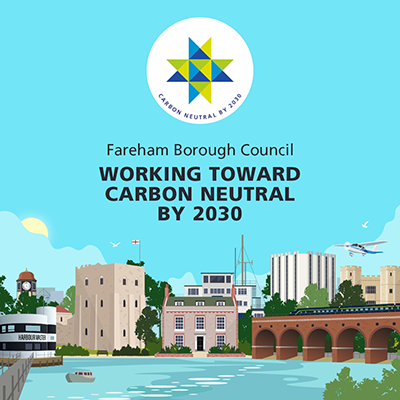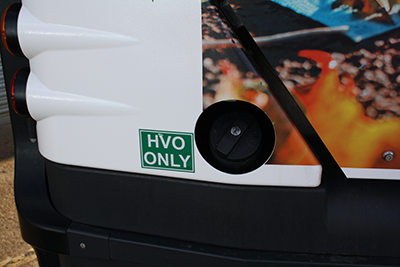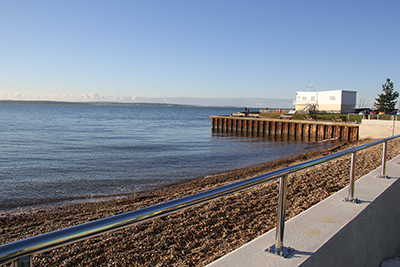The Council's journey to Carbon Neutral
This page outlines what Fareham Borough Council is currently doing to reduce its carbon footprint and how it plans to further reduce its emissions in the long-term.
You can also read our latest Climate Change Action Plan progress report ![]() (13 MB) which covers what we have achieved so far and the next steps in our journey.
(13 MB) which covers what we have achieved so far and the next steps in our journey.
The Council's commitment to the environment
- Since 2011: 'Protecting and Enhancing the Environment' has been a key priority in our Corporate Strategy.
- September 2019: Declared our commitment to work towards becoming carbon neutral by 2030
- October 2019: Started work on measuring our carbon footpint for the first time
Calculating our Carbon Footprint
- In order to tackle our carbon emissions, we first had to properly understand where they came from
- So we calculated our carbon footprint. Our emissions come under three categories:
- Scope 1 is all the direct emissions released from the Council's activities e.g. its vehcile fleet
- Scope 2 is any indirect emissions from electricity purchased and used by the Council e.g. the electricity for its offices
- Scope 3 is any other indirect emissions from Council activities, occuring from sources we don't control e.g. the gas and electricity at our lesiure centres
We calculated our carbon footprint in line with HM Government Environmental Reporting Guidelines. Under these guidelines we didn't have to report our Scope 3 emissions. However, we decided to include them for a more complete picture.
You can read our Climate Change Action Plan Progress Report ![]() (13 MB)for more information.
(13 MB)for more information.

Our Climate Change Action Plan
- In June 2021 we approved our Climate Change Action Plan
 (240 KB)
(240 KB) - Understanding our carbon footprint allowed us to put together a plan to reduce our impact on the environment
- The main focus of the Plan is on projects that will help reduce the Council's own carbon footprint, but it also looks to:
- Help reduce Borough wide carbon emissions where we can
- Protect Fareham's communities through adaptation and resilience measures
Our Key Projects
How we are working to reduce our own carbon footprint:
- Investigating opportunities for how to improve the energy efficiency of our buildings
- Reducing our printing for committee meetings, with agendas and reports now being read online
- Running a bio-fuel trial for our garden waste collection vehicles. The fuel, hydrotreated vegetable oil (HVO), is made from things like used cooking oils and waste fats. HVO has the potential to reduce CO2e emissions by approximately 88%
- Converting our fleet of small diesel vehicles to operate using HVO. The shift to HVO will reduce the Council's annual carbon footprint by approximately 155 metric tonnes of carbon dioxide per year.
- Exploring opportunities for ultra-low emission vehicles e.g., electric in parts of our fleet. Our first electric van went into service in 2020.
- Switching to a zero carbon electricity tariff for 2022/23. This means our energy provider match all the electricity we use with zero carbon energy, which it then feeds back into the national grid. Therefore, our emissions from electricity usage are eliminated.

Encouraging carbon reduction across the wider Borough:
- Increasing the number of resources available on the Council's website
- Engaging with the local community to disperse information and awareness
- Approved £30,000 to fund carbon reduction measures for our community centres
- Promoting opportunities for residents to benefit from government funding to help improve the energy efficiency of their homes
- Sustainable Warmth is a Government-funded programme that follows on from the Local Authority Delivery Phase 2 (LAD2) to tackle fuel poverty.
- There is a government funding scheme to improve the energy performance of UK homes with improvements such as solar panels, new insulation, double glazing or even a new front door. If eligible, Fareham residents can benefit from up to £10,000 per property.
- Find out more on our Get Advice webpage
Greening, adaption and resilience:
- Working together with Coastal Partners to protect our coastline, enhance the natural environment and maintaining coastal defence structures
- Exploring the feasibility of potential options for a Solar Farm on Council land.
- Adopting more land at Coldeast, Abbey Meadows in Titchfield, and Daedalus Common
- Managing our natural green spaces with a dedicated team
- Creating a tree planting scheme to commemorate the Platinum Jubilee by providing residents, community groups, organisations, clubs and businesses with the opportunity to sponsor a commemorative tree. This sites provide areas of protected wildlife habitat to encourage biodiversity
- Supporting the Borough's biodiversity by establishing a balance between planning growth and protecting the natural environment through our Local Plan

Challenges going forward
While we have already made some great progress towards our carbon neutral target, we still have some key challenges to overcome:
- Site gas: Heat is generated in our offices by burning natural gas, which releases greenhouse gasses. At the moment there are not many carbon neutral alternatives to this gas and the options that are available such as bio-methane, a carbon neutral alternative, would increase the cost of heating Council buildings considerably
- Vehicle replacement: even if we used HVO in all Council vehicles it would not make our fleet carbon neutral as HVO still has a carbon footprint. The other options open to us are hydrogen powered vehicles and electric vehicles, however:
- The infrastructure to have hydrogen delivered to the Council depot is not yet in place
- Hydrogen powered Refuse Collection Vehicles (RCVs) are still in the early phases of testing
- Electric RCVs would require huge investment in infrastructure at the depot to enable us to charge the vehicles
- The cost of an electric RCV is significantly more expensive than an equivalent diesel-powered vehicle
- These are some of the tough challenges the Council faces along its journey to become Carbon Neutral
- We now have a dedicated climate change team who are working on the projects in our current action plan, as well as investigating new carbon saving opportunities
- We will publish annual reports in order to keep our residents informed of our progress
